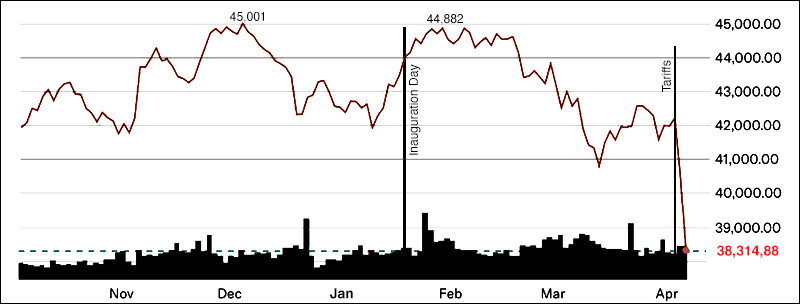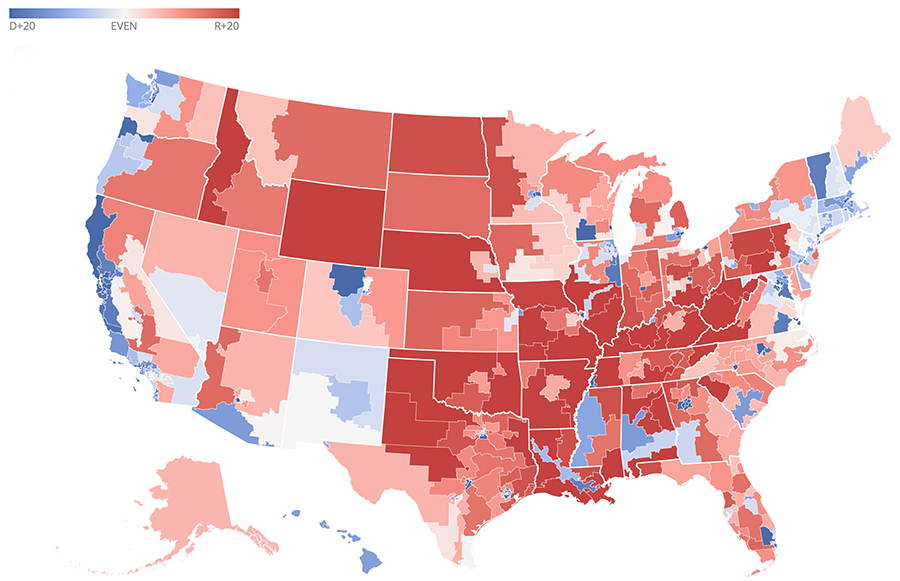• Trump Guts America's Cyber Defense
• Trump Has Lit a Fire under the Democrats
• Senate Republicans Pass a Budget Framework
• Measles Is Now in 22 States and Trump Is Clawing Back Vaccine Money
• The November Election Is Not Over in North Carolina
• More Than 500 Law Firms Denounce Trump
• Federal Judges Are Running Out of Patience
• AOC Leads Chuck Schumer in Poll of a Possible 2028 Senate Primary
• Charlie Cook Releases the New House PVIs
Trump's Trade War on Reality
Donald Trump promised to be a disrupter. On this, he kept his word. He has ended the 80-year pax Americana and is busy destroying the U.S. and world economy. Not bad for only 78 days. Just imagine what he can do in the next 1,383 days.
On Friday, the Dow Jones index fell 2,231 points (5.5%), the S&P 500 fell 322 points (5.97%), and the NASDAQ fell 963 points (5.8%). It was the worst week for the markets since the pandemic hit in 2020 and the end is probably nowhere in sight. The high this year was 44,882 on Jan. 30, 2025. The close Friday was 38,315, down 6,567 points (14.6%) from the 2025 high. This is considered a correction. It takes a 20% drop to be called a bear market. This is important because Trump tends to rate his self-worth by the markets, and the markets are not happy about his tariffs. Here is the Dow Jones for the past 6 months:

The drop of Thursday and Friday wiped out $6 trillion of value from the markets in 2 days. That is as much as the entire federal budget. Is anybody worried? Well, Treasury Secretary Scott Bessent is so freaked out that he wants to quit while the quitting is good and before Trump blames him for the upcoming disaster. Oh, and JPMorgan Chase, the country's largest bank, is now predicting a recession for later this year.
So what are the political effects of the meltdown going to be? To some extent it depends on whether other countries put tariffs on imports from the U.S., which would reduce markets for those products and likely put the workers who make them on the unemployment line. That could cause the recession JPMorgan Chase is worried about.
Recessions come and go, but this time things are different. Since World War II, the world order, led by the U.S., has featured free trade as the underlying economic model for almost all countries, except a few highly isolated countries like North Korea. The underlying premise is that if your country can make widgets (or t-shirts or iPhones or whatever) better and cheaper than any other country, then you get to own the worldwide market for widgets. This allows people everywhere to get the best products at the lowest prices. For 80 years, it has largely worked.
Donald Trump just ended the entire system because he believes in the 18th century concept of mercantilism. In this economic model, the goal of all countries is to export more stuff than they import, so as to accumulate more gold in the national treasury. No serious economist has believed in this theory in well over 100 years, but then again, Trump is not a serious economist.
Fareed Zakaria has an interesting column on Trump's thinking and how badly it differs from reality. Trump sees the U.S. as a poor, hollowed-out colony, victimized by a cruel world that has robbed it of jobs, industries and money. The reality is the opposite. In 2008, the U.S. economy was the same size as the Eurozone's; now it is double. In 1990, the average U.S. wage was 20% higher than other advanced countries; now it is 40% higher. In 1995, a Japanese person was 50% richer than an American in terms of GDP per capita; now an American is 150% richer than a Japanese person. An American in the poorest state, Mississippi, now has a higher per capita GDP than someone in the U.K., or France. All this happened due to the trading system that Trump does not understand but is trying to destroy.
Another very important thing Trump does not understand is that while the U.S. runs a trade deficit in things, it has a massive surplus in services. It exports a huge amount of software, software services, cloud computing, movies, video streaming, music, financial services, legal services, telecommunications services, management consulting services, and licensing of patents and other intellectual property. The export of services is worth well over $1 trillion/year. And every year, services become more important than "things." Trump is a real estate developer and he thinks in terms of large objects (and sometimes very small objects), not intangibles. He simply does not understand modern economies. His thinking will probably make the U.S. a poorer country run by corrupt oligarchs that can swagger in its neighborhood, but only watch helplessly as China comes to dominate a world from which America has voluntarily given up all its immense soft power.
If there is a trade war, some sectors will get hit especially hard. One is agriculture. When countries retaliate with their own tariffs to respond to Trump's, American food exports will become more expensive and importing countries are very sensitive to food prices. If Brazil or Argentina can provide the same food at lower prices, they get the sales. In Trump v1.0, retaliatory tariffs hit American farmers so hard that Trump felt it was necessary to give farmers $28 billion in free money to bail them out.
Now the situation down on the farm is worse. Inflation has sent the cost of seed, fertilizer, and other inputs soaring, while higher interest rates have whacked the many farmers who borrow money to do their planting in the spring and pay it back after the harvest in the fall. But if foreign markets are lost to competitors, farmers may not be able to sell their produce or pay off their loans. Some of them may come to regret their votes for Trump.
Fed Chairman Jerome Powell is worried about Trump's tariffs. He thinks they will increase inflation, possibly long term. This would force Powell to raise interest rates to stop it. But doing that could throw the country into a recession and put millions of people out of work.
What Powell is really concerned about is stagflation, a combination of a stagnant economy with high unemployment along with high inflation. Readers of a certain age may remember that from the 1970s, when it didn't work out so well for Jerry Ford or Jimmy Carter. And they even had the excuse that the problem was caused by oil sheiks in the Middle East. Trump has no such excuse.
Powell has no magic wand to wave over the economy to fix it. If he sets the interest rates too high, unemployment will go up. If he sets them too low, inflation will go up. It's the classic "Goldilocks problem." Trump doesn't like Powell because Trump wants to force interest rates down, come hell or high water, but Powell is worried about inflation. If Trump fires Powell, something the president ostensibly doesn't have the authority to do, it would create financial chaos, and the markets will really tank like never before.
David Frum brings up an interesting point we haven't seen elsewhere: smuggling. If an iPhone that normally costs $1,000 is suddenly $1,540 on account of the 54% tariffs Trump has imposed on China, the iPhone will still cost $1,000 (retail) in Canada, Mexico, and other countries. No doubt some clever criminals are going to load up on them at $1,000 there, drive them over the border during rush hour traffic when it is impossible for the border patrol to search every car thoroughly, and sell them in the U.S. for $1,200. It wouldn't be hard to pack 60 iPhones in a box of roughly 1 cubic foot filled three-quarters full with iPhones and one-quarter full on top with books, in case a CBP inspector wants to take a peek. That's potentially a $12,000 profit per run, more if the criminal gets a quantity discount from his source. And it's not just iPhones. There is likely to be a massive increase in smuggling of all kinds of products. Trump might have known this if he knew anything about the 1920s and Prohibition, but his study of U.S. history ended with the year 1783, when George Washington conquered the last few British airports.
Famous economist Ted Cruz (R-TX) said that if the tariffs are permanent, they will raise prices, increase inflation, destroy jobs, and damage the economy. Then, on his podcast, he added: "If we go into a recession, particularly a bad recession, 2026, in all likelihood, politically, would be a bloodbath. You would face a Democrat House and you might even face a Democrat Senate." He reminded his listeners that during a recession, the voters tend to punish the president's party.
Even Sen. Rand Paul (R-KY) had something to say to reporters: "Tariffs have also led to political decimation. When McKinley most famously put tariffs on in 1890, they [the Republicans] lost 50 percent of their seats in the next election. When Smoot and Hawley put on their tariff in the early 1930s, we lost the House and the Senate for 60 years. So they're not only bad economically; they're bad politically."
In other words, Republican senators understand that the tariffs could be their undoing, but they are so afraid of Trump that they don't dare say "no" to him. Apparently each one thinks that a primary threat is worse than a massive blue wave that sweeps the entire party out of power for decades. Future historians may have a lot of trouble understanding how the senators clearly saw this coming and did nothing. Heck, we can confirm that even current historians have a lot of trouble understanding it.
A key question no one can answer now is: How much of the damage Trump is doing to the country can eventually be repaired? A future Democratic president or Congress could kill off all the Trump tariffs and try to rebuild all the agencies Elon and the Muskrats are busily hollowing out, although that would take time—and the American people are exceedingly impatient. One area that could take years, or maybe decades, to rebuild is foreign allies' trust. It might take multiple Democratic presidents and at least one normie Republican president. As one European diplomat put it: "We can't have European security depend on the voters in Wisconsin every 4 years." (V)
Trump Guts America's Cyber Defense
Donald Trump's view of economics goes back to about the 1950s (or maybe the 1750s), but his view of war goes back to World War I. He envisions great tanks battling it out on some distant plain. It hasn't dawned on him yet that if a $5 million tank can be destroyed by a $100,000 javelin missile, something amply demonstrated in Ukraine, then tank battles aren't going to happen anymore. Future wars may be won on the cyber battlefield. If one country can disable the other's military command and control system, its electricity production, telecommunications, and water supply systems by hacking its software, it may be able to win without firing a shot. And if it can interfere with elections enough to elect friendly leaders who will do its bidding, war can be avoided altogether.
So how is Trump preparing for a future cyberwar? As we noted on Friday, he just fired the head of the National Security Agency, Gen. Timothy Haugh, and his deputy, Wendy Noble, because conspiracy theorist Laura Loomer told him to do so. Is Haugh incompetent? No, he is a decorated four-star Air Force general who was head of the U.S. Cyber Command. If anything, he is too good at collecting data, including about U.S. citizens, which led Sen. Ron. Wyden (D-OR) to oppose his confirmation. But that is not why he was fired. He was fired because Loomer feels his primary loyalty is to the country rather than to Trump. In part, that may be due to Haugh's work in 2016 trying to counter Russia's attempts to influence the presidential election. Once reminded of that, Trump didn't need a lot more urging to dump Haugh.
The NSA is the most secret of the secret agencies. When reporters ask about what the NSA is and does, they are told "No Such Agency." The agency is so secretive that supposedly even Congress doesn't know what its budget really is (it is buried in the DoD budget somewhere). Even its huge headquarters building in Fort Meade, MD, tries to hide itself:

The NSA's actual job is to collect and analyze (electronic) intelligence about enemies, which includes a lot of code breaking. In fact, the NSA is reputed to be the world's biggest employer of mathematicians. It is also responsible for penetrating enemy computer systems and defending U.S. ones. Firing Haugh and replacing him with a Trump lackey is a clear message to Russia and China that they should ramp up their attempts to penetrate all manner of U.S. computer systems and install back doors, so they can get in easily when crunch time comes. Sen. Mark Warner (D-VA), ranking member of the Senate Intelligence Committee, said: "At a time when the United States is facing unprecedented cyberthreats—as the Salt Typhoon cyberattack from China has so clearly underscored—how does firing him make Americans any safer?" The Salt Typhoon attack refers to the Chinese penetration of the system the U.S. Department of Justice uses for wiretapping when authorized by a court order. The DoJ also believes that the Chinese can read some e-mails sent by Americans to other Americans, including government officials.
Even Republicans are critical of the firings. Rep. Don Bacon (R-NE), a retired Air Force brigadier general, said: "Russia and China are laughing at us today because we just fired the absolute best leaders."
The firings at the NSA aren't the only domestic attacks on U.S. security. In March, Trump cut the budget of the 300 people at the Cybersecurity and Infrastructure Security Agency (CISA) and fired 300 people. The agency works to protect U.S. infrastructure from foreign attacks. This includes election security, since the counties, which actually run elections, generally know next to nothing about cybersecurity and are entirely dependent on CISA for protection. By sidelining CISA, Trump has opened the door wide to foreign interference. We have our doubts that Loomer understands this stuff, so the order must have come from somewhere else. Who might be interested in weakening American infrastructure and election security? VP? (V)
Trump Has Lit a Fire under the Democrats
After months of not doing anything, opponents of the Trump regime demonstrated en masse at locations all over the U.S. on Saturday. Some reports said 1,200 locations while others put it as high as 1,400. The people were protesting dozens of administration policies and especially Elon Musk's (most likely illegal) efforts to single-handedly dismantle the U.S. government and fire hundreds of thousands of people in the process. Below are photos of the protests in six cities.






It you want to see many more photos, the Associated Press has a large collection of them. So does NPR. If you are interested in some of best signs people had, here is a collection.
If you prefer videos, here is one:
If you go to YouTube and search for "Hands Off" you will find dozens of them, as many local TV stations covered the action in their cities.
And it wasn't just in the U.S. There were protests in many foreign cities as well. Here's one from London:
The Hands Off! organizers said that 600,000 people signed up, but many more may have come without signing up. They issued a toolkit for planners to use in their own city, but for the most part, the events were organized locally without any central direction. The toolkit listed three key demands:
- An end to the billionaire takeover of the government and an end to the corruption in the Trump administration.
- An end to slashing federal programs like Medicaid and Social Security that working people depend on.
- An end to the attacks on immigrants, trans people, and other communities.
The protests took different forms in different cities. In some there were marches and in others there were rallies with speakers. People held signs with many different messages. Some people were defending education, health care, the press, the arts, science, veterans care, free speech, Social Security, and much more. Some people were protesting all the firings, without regard to the department. Some protested the way the administration picked people off the streets and disappeared them, a practice common in dictatorships. There were many signs blaming Elon Musk for the administration's actions.
At the National Mall in D.C., there were 100,000 demonstrators. Rep. Jamie Raskin (D-MD) told the crowd: "Our founders wrote a Constitution that did not begin with 'We the dictators.'" He slammed Trump for many policies, including the new tariffs: "Their tariffs are not only imbecilic—they're illegal, they're unconstitutional, and we're going to turn this around." Other speakers included Reps. Ilhan Omar (DFL-MN) and Maxwell Frost (D-FL).
There were no reports of disturbances or arrests at any of the protests.
Will over 1,000 protest events change Trump's plans? We doubt it, although Trump could speed up Musk's planned departure, since the head DOGEy is very unpopular. Republican representatives and senators up in 2026 will probably take note of the energy out there. Many of them will probably realize that if there is a recession, the opposition will only grow and some members in purple (or even purple-red) districts could be toast. We haven't reached a tipping point yet, but that could yet happen if things get worse.
Another thing the marches and rallies will do is give some people hope. They thought they were alone, but now they know there are millions of other people who think the same way they do. In any battle, especially a long one, morale is important and Saturday will be a morale booster for many people.
We have had reports (and sometimes pictures) from some readers about the protests, and we're going to run an item tomorrow. If anyone else has reports/pictures, please consider sending them to comments@electoral-vote.com. (V)
Senate Republicans Pass a Budget Framework
Friday night and Saturday morning, the Senate conducted an hourslong vote-a-rama on the budget plan. Senate rules allow senators to offer amendments, and the Democrats offered plenty of them, even though they knew none would be adopted. Their plan is to later use the votes to smear Republican senators for voting against measures that the voters like, such as banning cuts to Social Security, firing Elon Musk, blocking the new tariffs, and forbidding Defense Dept. officials from using private apps to discuss war plans. Now there will be ads like: "Democrats wanted to prevent Elon Musk from gutting Social Security, but Sen. [X] voted to allow him to keep doing it." Republicans weren't entirely unified, but in the end, the measure passed by a 51-48 vote, with Rand Paul and Sen. Susan Collins (R-ME) voting against it for various reasons. Rand voted "no" for ideological reasons; Collins voted "no" because the 2026 election is going to be a tough one for her.
Among other things, the plan would make the 2017 tax cuts permanent and provide $1.5 trillion over 10 years in additional tax cuts. It also covers energy, immigration and defense.
One of the most controversial issues is magic accounting that assumes the 2017 tax cuts don't expire this year. The rules say that a bill passed via reconciliation cannot increase the deficit over the current value 10 years down the road. That requires first creating a baseline of what the deficit is now. By pretending the tax cuts don't expire, the baseline will be the current $1.8 trillion deficit, allowing it to be $1.8 trillion in 2025. However, if there are no new tax cuts, the 2017 ones will expire and the government will get lots of new revenue, greatly reducing the deficit to much less than $1 trillion. This would make it impossible to use reconciliation to renew the tax cuts and carry out all of Trump's expensive plans without decimating the military, Social Security, Medicare, and Medicaid. And, of course, a giant-tax-cut bill has no hope of passing through normal order, thanks to a surefire Democratic filibuster.
Some senators don't like the use of magic accounting because it, in fact, allows the deficit to grow (which they are against), and also because they know that some day the Democrats will do the same thing, claiming the Republicans pioneered the concept. Not surprisingly, the magic accounting was included in the bill, but Senate parliamentarian Elizabeth MacDonough could call foul once the Senate and House have agreed on an actual bill. Sen. Lindsey Graham (R-SC), foreseeing this, said that he and the Republicans may "bypass" MacDonough. That is just a polite way of saying that they might ignore her.
This doubles down on the "Democrats will do the same thing" part of the GOP strategy. In fact, it triples down, or quadruples down. If Republican committee chairs like Graham are allowed to unilaterally decide what does, and what does not, count for reconciliation, then Democratic committee chairs are allowed to do the same thing. Once the Democrats regain the upper chamber, then likely Senate Finance Committee chair Jeff Merkley (D-OR), who is one of the leftier members of the Senate, is going to be like a kid in a candy store. Medicare-for-all? Lifting the earnings cap for Social Security? Funding 500 new federal judges, to be appointed by a Democratic president? All legal under reconciliation. Ignoring the parliamentarian is not much different from just killing the filibuster. For that reason, many outlets are describing Graham's threat as "the nuclear option." If he goes through with it, and his fellow Republicans sustain him, don't be surprised to see the filibuster fall next. The consequence might not actually be so horrible: majority rule. If 51 senators, 218 representatives, and the president wanted a bill to pass and become law, it would pass and become law. Weird, huh?
The bill the Senate passed also has to pass the House, which will undoubtedly modify it in many ways. The House Freedom Caucus wants to gut spending much more than the Senate bill does. Also, half a dozen House members from bluish districts in New York and California say they want to raise the cap on deducting state and local taxes (SALT) and their votes depend on this. That puts them on a collision course with the FC.
One of the biggest differences between the Senate plan and what is developing in the House is how to pay for the tax cuts. The Senate version directs the committees to cut only $4 billion in spending, on account of the magic accounting trick. The House version intends to cut at least $1.5 trillion, to actually offset the new tax cuts. If MacDonough rules that the magic accounting is not allowed, and Senate Republicans decide to listen to her, then the final bill will look more like the House bill than the Senate bill. The Senate version also raises the debt limit by $5 trillion. Many FC members are dead set against that.
Once the House is finished, a single version has to be worked out. That is where the sausage is made. It won't be pretty. It never is. The bill is not an appropriations bill. It merely tells the various committees how much they can spend. Where they cut to keep below the limit imposed by the bill is up to them. That part won't be easy either. (V & Z)
Measles Is Now in 22 States and Trump Is Clawing Back Vaccine Money
The measles epidemic that started in Texas is now in 22 states, with 483 cases reported and undoubtedly many more not reported. Measles can be deadly. A second child has now died from it. So what has the Trump administration done? It clawed back $12 billion intended for vaccine clinics. The money was originally appropriated during the COVID-19 pandemic but the CDC issued a memo stating that states can use the money for other vaccinations as well. It could have been used to provide measles vaccinations, for example.
A group of 23 states has sued the administration to allow them to keep the money and use it for measles and other vaccinations, but the official response was that doing so would be unnecessary and wasteful.
Adriane Casalotti, spokesperson for National Association of County and City Health Officials, said: "This was the CDC who wrote the grants and it was approved by the federal government. We have not seen this in public health—where money already obligated and out the door was clawed back."
In Dallas, for example, officials have had to cancel plans for 50 clinics. Philip Huang, director of the Dallas County Heath and Human Services said: "It's very disruptive, and I think it is intentional. This isn't just affecting blue states or red states or red communities. This is affecting everyone." In Washington state, 104 clinics have been canceled. Many other states are also affected.
It is not clear if the clawback is the work product of DOGEy Elon Musk or Secretary of HHS Robert Kennedy Jr. They have different goals. Musk just wants to wreck the federal government so it can't come after oligarchs like him. Kennedy doesn't believe in vaccines. He wants to review the measles vaccine to see if it causes autism, despite there not being a shred of scientific evidence that it does. The entire vaccines/autism "controversy" is "based" on a single 1998 paper by Andrew Wakefield published in a British medical journal. After investigating the paper carefully, the journal later retracted it as dishonest and fraudulent. A further investigation by the British Medical Council resulted in Wakefield having his medical license revoked due to the fraud, prohibiting him from practicing medicine in the U.K. Nevertheless, the damage had been done. (V)
The November Election Is Not Over in North Carolina
Republican Jefferson Griffin narrowly lost a state Supreme Court decision in North Carolina in Nov. 2024, and ever since then he has been trying to use the courts to do what the voters refused to do: put him on the state Supreme Court. The case is testing the limits of changing the rules after the election is over, all the votes have been counted, and the winner has been seated.
Back in November, Justice Allison Riggs beat Griffin by 734 votes out of 5.5 million cast across North Carolina. She was sworn in and seated on the court. Griffin didn't like the results and has been fighting it ever since. His argument is that 65,000 people who cast ballots were legally ineligible to vote because they didn't provide proof of identity when they registered. Until last year, the registration form didn't even ask for ID information, like a driver's license number or partial Social Security number. However, in court filings it is clear that many of them did provide proof, but due to administrative errors, name changes after marriages, and other reasons, they didn't appear in the database. Griffin admits that the voters did nothing wrong and followed all the laws, but since there was no proof of identity in the database, he argued that their votes should be discarded.
The state board of elections threw out Griffin's case but now an appeals court ruled for him, 2-1, along party lines. The panel also ruled that the voters should get 15 days to "cure" their defective registrations. Key issues are how the voters would be notified, how they would be allowed to cure their registrations, and what about overseas voters. The majority also wrote that people who never lived in North Carolina should not be allowed to vote there. This mostly deals with the children of military parents who are stationed abroad and the children of missionaries. Federal law mandates that U.S. citizens who never lived in the U.S. may vote in the state their parents last lived in for federal elections, but is silent on state elections.
The case will be appealed to the state Supreme Court, which has a 5-2 Republican majority. If Riggs recuses herself, it will then be 5-1. It may well yet end up in the federal courts, possibly even up to the Supreme Court.
The Democrat on the panel strongly dissented, writing that changing the rules after an election and only for one race was "directly counter to law, equity, and the Constitution."
If it is ultimately decided to retroactively invalidate some votes, it is not clear how those ballots would be located and uncounted. Ballots generally have a unique number on them for security purposes (to detect fake ballots stuffed into the ballot box), but uncounting ballots would require matching invalid voters with invalid ballots somehow. Most of the contested ballots come from heavily Democratic areas, but surely the courts would not allow statistical methods to be used rather than counting actual votes. (V)
More Than 500 Law Firms Denounce Trump
More than 500 law firms denounced Donald Trump for his attack on multiple large law firms and his extorting them into devoting up to $100 million for pro bono work on causes he favors. None of the 20 biggest law firms in the country were among the 500.
What the 500 firms did was sign an amicus brief in the case of Perkins Coie, which is challenging Trump's authority to penalize them just because they won't obey his every whim. The brief said: "Whatever short-term advantage an administration may gain from exercising power in this way, the rule of law cannot long endure in the climate of fear that such actions create." The administration regards the rule of law as a nuisance, but the judge may think otherwise.
George Conway, on a podcast at The Bulwark, has an explanation why some firms just kowtow to Trump and others fight him. It has to do with the nature of their business. Many of the larger law firms do a lot of merger and acquisitions work for giant corporations. These cases are done on a contingency basis. If the deal goes through, they get paid a percentage of the size of the new company. If the deal does not go through, they get zero. In many of these cases, the merger or acquisition has to be approved by the federal government for one reason or another. The firms that do this kind of business are afraid that Trump will simply order any merger or acquisition they shepherd to be rejected in order to punish them if they don't submit to his rule, thus hurting the firm financially after all the work has been completed. Firms that do criminal defense, family law, complex contracts, patents and other work are much less afraid of Trump and are fighting him because he has no easy way to punish them. These include Perkins Coie, Jenner & Block, and WilmerHale. It's all transactional. (V)
Federal Judges Are Running Out of Patience
Donald Trump keeps doing illegal things and the courts keep smacking him down. In some cases, the judge issues orders and Trump ignores them or drags his feet complying. We are getting to the point that the judges have had enough and the stakes may be going up soon. The first test will be when Trump openly refuses to obey a court order he doesn't like. Or, more likely, when someone in his administration does that. While a judge can't order the president to go to prison, a judge can find other people in his administration in contempt of court and either fine them or order them to prison.
That's when we find out whether the system still works. If it is a federal judge, the judge will have to use the U.S. Marshals service, which is controlled by AG Pam Bondi. If it is a state judge, state law enforcement will be asked to handle the job. So far most cases have been federal, but that could change as some of the things the administration is doing violate both federal and state law.
Here are three examples where the judge is fed up:
- James Boasberg:
The issue here is the
deportation
of Venezuelans to a prison in El Salvador even though none of them were even indicted, let alone convicted, for a crime in
the U.S. Someone in the U.S. thought their tattoos indicated gang membership.
D.C.'s chief judge, James Boasberg, ordered the flights to El Salvador to turn around and come back
while they were in flight, but that didn't happen. Boasberg believes the administration simply
ignored his order and he is now investigating to see who is responsible. The administration's
lawyers are stonewalling him and his patience is running out.
- Paula Xinis: One of the people deported to El Salvador was Kilmar
Abrego Garcia. There was no basis for his deportation. He has not been accused of any crime. He is a
national of El Salvador but was granted protected status in the U.S. by an immigration judge in
2019. That should have been enough to prevent his deportation. He lives in Maryland with his
American wife. Judge Paula Xinis
ordered
the government to get him back in the U.S. by midnight tonight. The government claims it can't do
that because he is not in U.S. custody, even though it does admit he was deported due to an
"administrative error." The government has a contract with El Salvador to store the deportees. This
is a major source of income to the country and it is hard to imagine that El Salvador would refuse
to return Abrego Garcia if the U.S. government asked. It certainly doesn't want to upset its cozy
business arrangement with the U.S. Suppose Abrego Garcia is not back tomorrow—what will the
judge do then? We may find out.
- John McConnell:
Here the issue is Elon Musk
freezing FEMA funds.
This is impoundment and is illegal. U.S. District Judge John McConnell in Rhode Island ordered the
money Congress appropriated to be paid out. He ruled that FEMA has no discretion on this. When
Congress has passed a law ordering funds to be spent in a certain way, it must be done as Congress
directed. The government appealed McConnell's ruling and lost in the First Circuit. Multiple states
are waiting for the money Congress appropriated but FEMA is not disbursing it. The administration is
saying it is reviewing the cases. McConnell ruled that nothing in the law gives the administration
the power to review anything. He said the president must faithfully execute the laws. If Trump
continues to stall, McConnell could hold someone in contempt.
These are only three of the cases where the administration is stalling or trying to work around clear-cut court orders. We don't know what will happen if and when the government simply says: "We are not going to obey the court order because no one can make us do it." That could be true in a narrow sense, although the defendants in all the cases will try to get the Supreme Court to rule because the political consequences of Trump openly defying the Supreme Court would be much greater than defying a district judge. (V)
AOC Leads Chuck Schumer in Poll of a Possible 2028 Senate Primary
The 2028 Senate election in New York, when Sen. Chuck Schumer (D-NY) is up for reelection, is awfully far in the future. Nevertheless, the liberal group Data for Progress ran a poll on the race. For what it is worth, in a primary matchup between Schumer and Rep. Alexandria Ocasio-Cortez (D-NY), AOC leads Schumer 55% to 36% among likely Democratic primary voters.
The poll also did more than just ask for a choice. In one variant, some voters were given positive statements about each candidate. In another, some voters were given lines of attack about each of the candidates. In all variants, the results were roughly the same, with AOC almost 20 points ahead of Schumer.
Given the group's clear preference for AOC, these results should be taken with a barrel of salt. Still, why did the group even bother? One reason might be to get AOC thinking about running. If more polls show that she would beat Schumer in a primary, she would be more inclined to go for it. Another reason might be to show Schumer that he can't win the primary, so it would be better for him to leave on his own terms and retire in 2028, rather than being trounced by a young woman of color who has a track record of trouncing older white establishment men. No doubt this poll will stimulate other, more neutral, pollsters to run polls on the same primary. (V)
Charlie Cook Releases the New House PVIs
The Cook PVIs compare how each congressional district (and each state) voted in the past two presidential elections vs. the national average. The PVIs we have been using recently were based on the 2016 and 2020 presidential elections. However, there is now data for each district for the 2024 election, so The Cook Political Report has updated the PVIs to be based on the 2020 and 2024 elections instead (with 2024 weighted more heavily than 2020). The new PVIs were released (behind a paywall) last week. Here is a map of the country by congressional district with each one colored by its new PVI:

A simple visual inspection shows many well-known things. For example, eastern Washington, Oregon, and California are very different from the coastal regions. Many states are entirely red, while Hawaii and Delaware are the only states outside of New England with only blue districts. James Carville talked about Pennsylvania being Pittsburgh and Philadelphia with Alabama in between and the map verifies that. Some of the swing states, like Wisconsin, Michigan, and North Carolina, are almost entirely red except for one or two extremely blue districts. More generally, Democrats are packed into a tiny fraction of the area of most states outside the South. Looking at the map, you wouldn't think Minnesota was a blue state, but it is.
There are a number of interesting results that are not visible from the map. First, many minority voters voted for Donald Trump, so some heavily minority districts went from D+bignumber to D+lessbignumber. For example, the Blackest district in the country, GA-13, south of Atlanta, which is two-thirds Black, went from D+28 to D+21. The second Blackest district, AL-07, which includes Birmingham and Selma, didn't change as much, going from D+14 to D+13.
Second, the number of swing districts (D+5 to R+5) has gone up slightly, from 82 to 87, which is 20% of the House. Compare that to 1999, when 164 seats were in swing districts. All of these swing districts could be in play in 2026.
Third, there are more red districts R+6 or more (181) than blue districts D+6 or more (156).
Fourth, the bluest districts are bluer than the reddest districts are red. There are 15 at D+30 or bluer but only 2 districts are R+30 or redder. This is due to Democrats clustering in cities.
Fifth, the number of representatives in the "wrong" district is very small. Only three Republicans are in a D+x district: Don Bacon (NE), Brian Fitzpatrick (PA), and Mike Lawler (NY). However, there are seven Democrats in R+x districts: Henry Cuellar (TX), Don Davis (NC), Jared Golden (ME), Adam Gray (CA), Marcy Kaptur (OH), Marie Perez (WA), and Kristen Rivet (MI). All 10 of these will be top targets in 2026.
Sixth, Republicans drew far more maps than Democrats. Part of that is because there are more states with Republican trifectas than Democratic trifectas, but also because Democrats are "good government" types and (foolishly?) adopt constitutional amendments hamstringing their own legislatures from gerrymandering the hell out of the map by requiring independent commissions to draw the map. In all, 180 districts were drawn by Republicans vs. 67 drawn by Democrats. (V)
If you wish to contact us, please use one of these addresses. For the first two, please include your initials and city.
- questions@electoral-vote.com For questions about politics, civics, history, etc. to be answered on a Saturday
- comments@electoral-vote.com For "letters to the editor" for possible publication on a Sunday
- corrections@electoral-vote.com To tell us about typos or factual errors we should fix
- items@electoral-vote.com For general suggestions, ideas, etc.
To download a poster about the site to hang up, please click here.
Email a link to a friend.
---The Votemaster and Zenger
Apr04 Whiskeyleaks: IG Turns up the Heat on Hegseth
Apr04 Another Look, Part I: The Doors Look to Be Opening for the Democrats
Apr04 Another Look, Part II: Booker Is a Real Genius
Apr04 Election News: Spanberger, Adams Know How the Game Is Played
Apr04 I Read the News Today, Oh Boy: A Tombstone for Nobody
Apr04 This Week in Schadenfreude: A Look at the Super Week Elon Musk Just Had
Apr04 This Week in Freudenfreude: The Saint Goes Marching In
Apr03 Trump Starts a Trade War
Apr03 European Union Is Ready to Fight Back
Apr03 Trump Continues Threatening Universities and Law Firms
Apr03 DOGE Cuts Are Predominantly Hitting Blue Districts
Apr03 Mass Layoffs at HHS Are Starting
Apr03 What Will Elizabeth Do?
Apr03 Ken Paxton Will Challenge John Cornyn in Texas Senate Primary
Apr03 Mallory McMorrow Is Running for the Senate in Michigan
Apr03 Lucy McBath Suspends Her Gubernatorial Campaign
Apr03 Xavier Becerra Is Running for Governor of California
Apr03 Adelita Grijalva Is Running for her late Father's House Seat
Apr03 Judge Fully Dismisses the Eric Adams Case
Apr02 Democrats Have a Good Day. Maybe Even a Very Good Day.
Apr02 In Congress, Part I: Cory Booker Talks the Talk
Apr02 In Congress, Part II: House Republicans Don't Walk the Walk
Apr02 Another Setback for Anti-Choice Forces
Apr02 But His E-Mails!
Apr02 Another Law Firm Surrenders...
Apr02 ...So Does the White House Correspondents Association
Apr02 Funny Business
Apr01 Signal Scandal Isn't Going Away Quite Yet
Apr01 Today's Crazypants Report: This is What Grift Looks Like
Apr01 Will the Shadow Docket Be Used for Shady Things?
Apr01 Trump Teases Third Term
Apr01 Democratic Presidential Candidate of the Week, #39: Sen. Bernie Sanders (I-VT)
Apr01 This Is How the French Do It
Mar31 There Are Key Elections Tomorrow in Multiple States
Mar31 Louisiana Voters Reject All Four Republican-Sponsored Constitutional Amendments
Mar31 Stocks Plummet on Inflation Fears
Mar31 Tough Town Halls Keep Happening, Even in Deep-red Districts
Mar31 Voice of America Wins Round 1
Mar31 President of Columbia University Resigns after Groveling in the Dirt
Mar31 Michael Bennet May Run for Governor of Colorado in 2026
Mar31 New Congressional Progressive Caucus Chair Wants to Change Direction
Mar30 Sunday Mailbag
Mar29 Saturday Q&A
Mar29 Reader Question of the Week: I'm a Doctor, Not a President
Mar28 Whiskeyleaks: Who Will Take the Fall (if anyone)?
Mar28 You Win Some, You Lose Some: Stefanik Learns What She Should Already Have Known
Mar28 The War on Federal Employees Continues...
Mar28 ...And So Does the War on Women
Mar28 Video Killed the Reality Star

